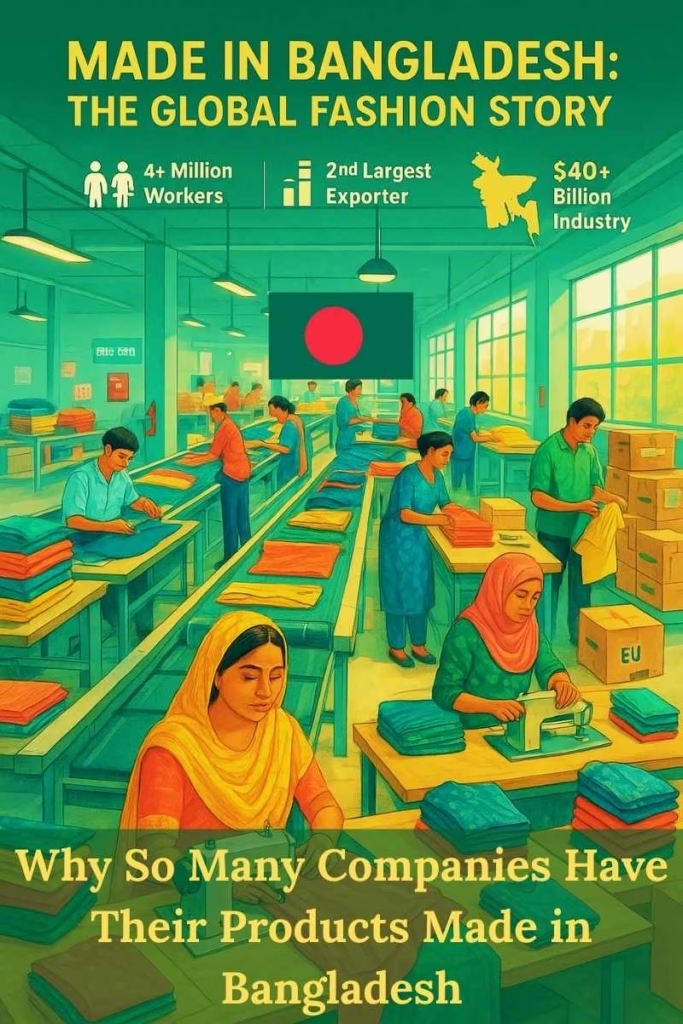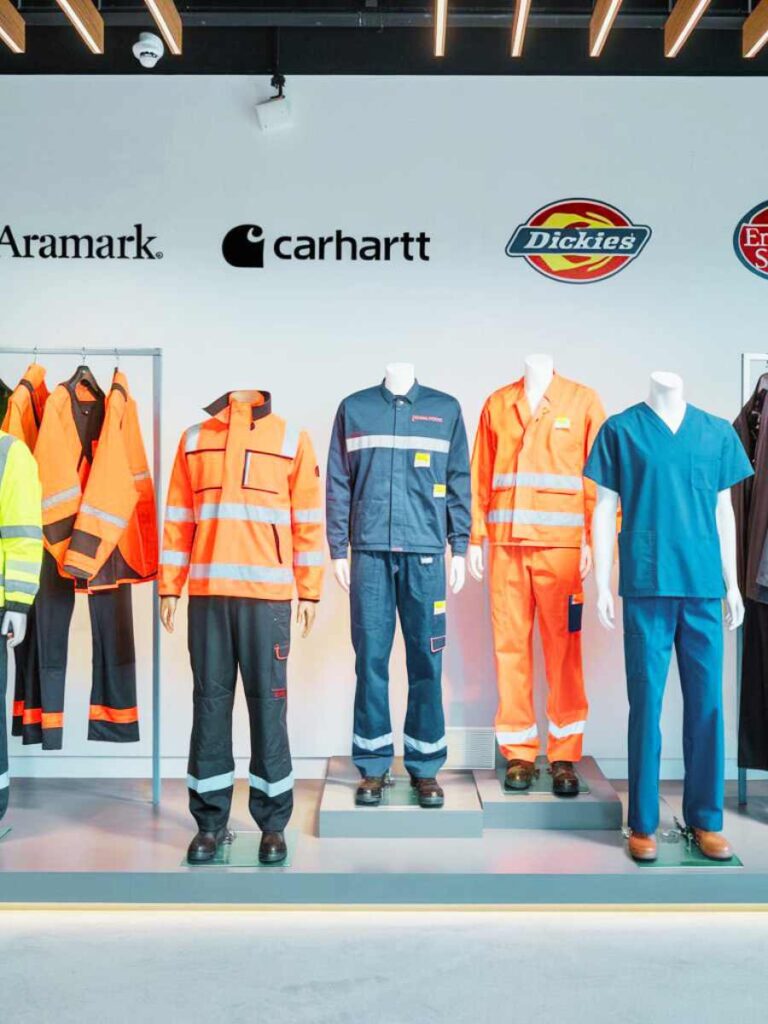Have you ever wondered why many companies have their products made in Bangladesh? When you check the tags on your clothes, shoes, or accessories, you’ll often find “Made in Bangladesh” printed there. This isn’t by accident – there are compelling reasons why many companies have their products made in Bangladesh rather than in other countries around the world.
Understanding Why Many Companies Have Their Products Made in Bangladesh
The answer to why many companies have their products made in Bangladesh is more complex than you might think. It involves economics, skilled workers, modern infrastructure, and strategic advantages that make Bangladesh an ideal manufacturing partner for global brands.
Bangladesh has earned its position as the world’s second-largest clothing exporter, and the reasons why many companies have their products made in Bangladesh extend far beyond simple cost considerations. This South Asian nation has built a comprehensive manufacturing ecosystem that serves brands ranging from small startups to major international corporations.
Economic Advantages: Why Many Companies Have Their Products Made in Bangladesh
Cost-Effective Manufacturing Solutions
The primary reason why many companies have their products made in Bangladesh is the significant cost advantages. But what makes manufacturing so affordable in Bangladesh?
Competitive Labor Costs: Bangladesh offers some of the most competitive labor rates in the global textile industry. Workers earn fair wages within the regional context while allowing companies to produce high-quality items at lower costs.
Affordable Raw Materials: Bangladesh has developed strong supply chains for cotton, synthetic fibers, and other textile materials, keeping input costs low and explaining why many companies have their products made in Bangladesh.
Lower Operational Expenses: Factory overhead costs, including utilities, rent, and equipment maintenance, are substantially lower than in developed countries.
Favorable Exchange Rates: The Bangladeshi Taka’s exchange rate with major currencies like the US Dollar and Euro provides additional cost benefits for international buyers.
The Economics Behind Manufacturing Decisions
When global brands analyze production costs, the savings are dramatic. A garment that costs $20 to produce in Europe or North America might cost $4-6 to produce in Bangladesh with identical quality standards. This substantial difference is a key reason why many companies have their products made in Bangladesh.
These savings benefit everyone in the supply chain: companies can offer more affordable products to consumers, consumers get better value for their money, and Bangladeshi workers receive steady employment that supports their families and communities.
Quality and Expertise: Core Reasons Why Many Companies Have Their Products Made in Bangladesh
Skilled Workforce with Decades of Experience
A crucial factor explaining why many companies have their products made in Bangladesh is the highly skilled and experienced workforce. Bangladesh’s textile workers have developed exceptional expertise over several decades.
Multi-Generational Skills: Many Bangladeshi families have worked in textiles for generations, creating a workforce with deep knowledge of garment construction, fabric handling, and quality control techniques.
Comprehensive Training Programs: Factories invest heavily in worker education, ensuring employees can meet the demanding quality standards of international brands – a major reason why many companies have their products made in Bangladesh.
Technical Proficiency: Workers understand complex garment construction techniques, from basic t-shirt assembly to intricate formal wear and specialized technical textiles.
Efficiency and Speed: Experienced workers can complete detailed assembly tasks quickly without sacrificing quality, making production timelines competitive with other manufacturing regions.
Quality Control Systems That Meet Global Standards
The sophisticated quality control systems in Bangladeshi factories provide another compelling reason why many companies have their products made in Bangladesh:
- Multi-Point Inspection: Products undergo quality checks at every stage of production
- International Compliance: Factories follow ISO standards and brand-specific quality requirements
- Advanced Testing Equipment: Modern machinery tests fabric durability, color consistency, and dimensional accuracy
- Trained Quality Teams: Dedicated professionals who understand international market expectations and standards
Infrastructure Excellence: Why Many Companies Have Their Products Made in Bangladesh
Strategic Geographic Location
Bangladesh’s location provides significant logistical advantages that explain why many companies have their products made in Bangladesh:
Major Port Facilities: The Port of Chittagong and other facilities handle enormous volumes of textile exports efficiently, connecting Bangladesh to global markets.
Regional Supply Chain Access: Located between India and Southeast Asia, Bangladesh offers excellent access to raw materials and regional manufacturing networks.
Efficient Transportation: Improved road, rail, and river transport systems connect factories to ports and suppliers seamlessly.
Time Zone Benefits: Bangladesh’s time zone facilitates communication with both Asian suppliers and Western buyers, improving coordination and reducing delays.
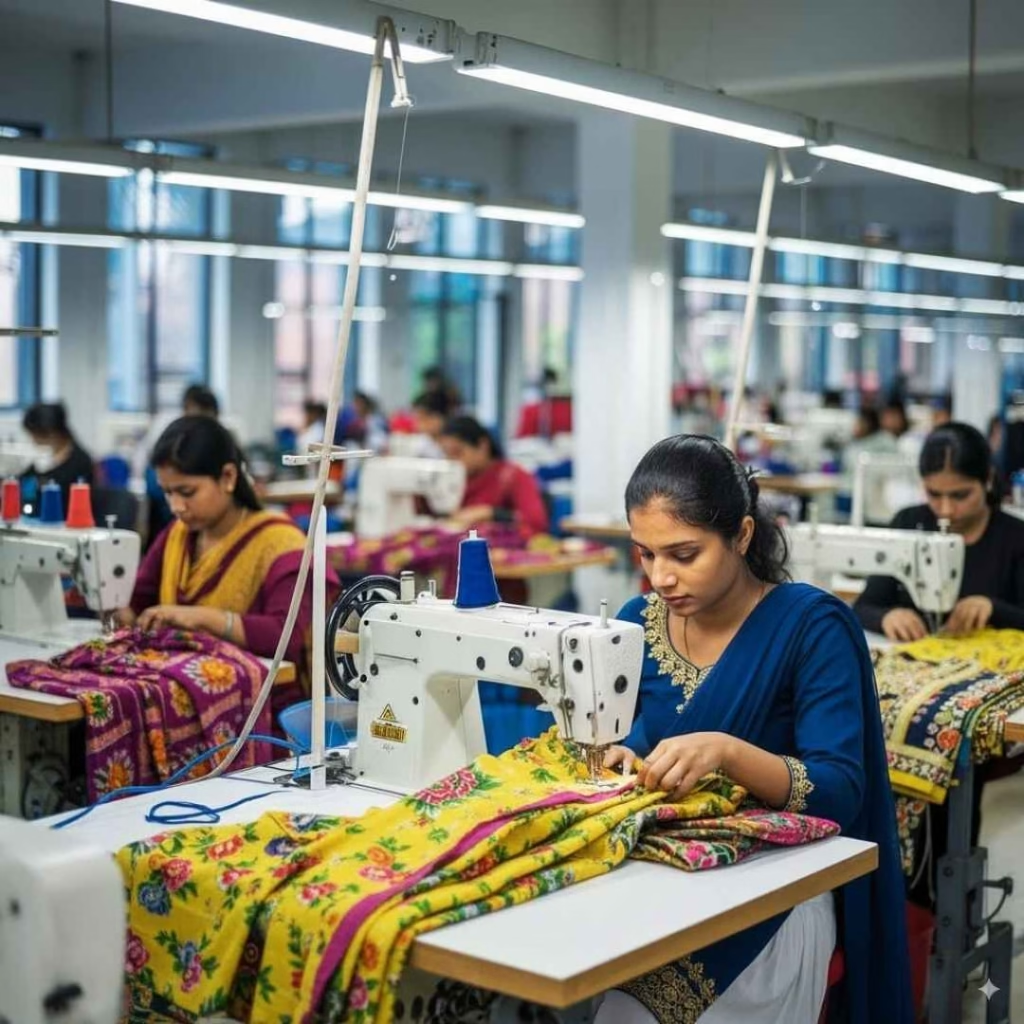
Manufacturing Clusters That Drive Efficiency
The concentration of textile facilities in specialized zones is another reason why many companies have their products made in Bangladesh:
Shared Infrastructure: Factories benefit from shared utilities, waste treatment facilities, and specialized services, reducing individual operational costs.
Integrated Supply Chains: Raw material suppliers, manufacturers, finishing services, and logistics providers are co-located, minimizing transportation time and costs.
Knowledge Networks: Proximity enables rapid sharing of best practices, new technologies, and market intelligence across the industry.
Economies of Scale: Clustering creates cost efficiencies that benefit all participants in the manufacturing ecosystem.
Government Support: Key Factors Why Many Companies Have Their Products Made in Bangladesh
Export-Promoting Policies
The Bangladesh government has implemented comprehensive policies supporting the textile industry, which explains why many companies have their products made in Bangladesh:
Export Processing Zones (EPZs): These special economic areas offer tax incentives, streamlined regulations, and world-class infrastructure specifically for export-oriented manufacturers.
Duty-Free Import Programs: Manufacturers can import raw materials and machinery without paying customs duties, keeping production costs competitive.
Investment Incentives: Both domestic and foreign investors receive financial incentives, tax holidays, and regulatory support to establish textile operations.
Bureaucratic Efficiency: Simplified procedures for permits, licenses, and compliance make it easier for companies to establish and expand operations.
International Trade Agreements
Favorable trade relationships are crucial factors explaining why many companies have their products made in Bangladesh:
European Union Access: Bangladesh enjoys duty-free access to EU markets under the “Everything But Arms” initiative, making exports highly competitive.
Preferential Trading Status: Many countries offer Bangladesh preferential trading terms under various Generalized System of Preferences programs.
Bilateral Agreements: Specific trade agreements with major importing nations provide additional competitive advantages.
WTO Benefits: World Trade Organization membership ensures most-favored-nation treatment with trading partners worldwide.
Safety and Compliance: Modern Reasons Why Many Companies Have Their Products Made in Bangladesh
Comprehensive Safety Improvements
Following significant safety incidents in the past, Bangladesh has implemented massive improvements that now serve as positive reasons why many companies have their products made in Bangladesh:
Structural Safety Standards: All manufacturing facilities undergo regular engineering inspections to ensure building integrity and worker safety.
Advanced Fire Safety: State-of-the-art fire prevention, detection, and suppression systems are mandatory in all textile facilities.
Emergency Preparedness: Comprehensive safety training ensures workers know how to respond to various emergency situations effectively.
International Oversight: Global monitoring organizations conduct regular audits to maintain international safety and compliance standards.
Ethical Manufacturing Leadership
Ethical considerations have become important reasons why many companies have their products made in Bangladesh:
Worker Welfare Programs: Improved working conditions, healthcare benefits, and educational opportunities for employees and their families.
Environmental Stewardship: Many factories have adopted cleaner production technologies, waste reduction programs, and sustainable manufacturing practices.
Social Responsibility: Compliance with international labor standards, respect for worker rights, and community development initiatives.
Transparency Commitment: Open communication about manufacturing practices builds trust with international brands and conscious consumers.
Product Manufacturing Diversity: Why Many Companies Have Their Products Made in Bangladesh
Comprehensive Production Capabilities
The wide range of products that can be manufactured represents another reason why many companies have their products made in Bangladesh:
Basic Apparel: Everyday clothing items like t-shirts, jeans, casual wear, and undergarments.
Fashion Items: Trendy designs, seasonal collections, and fashion-forward pieces for style-conscious consumers.
Specialized Products: Work uniforms, sportswear, technical textiles, and performance clothing.
Luxury Goods: High-end fashion pieces, designer collections, and premium textile products.
Accessories and More: Bags, home textiles, scarves, and various fabric-based products
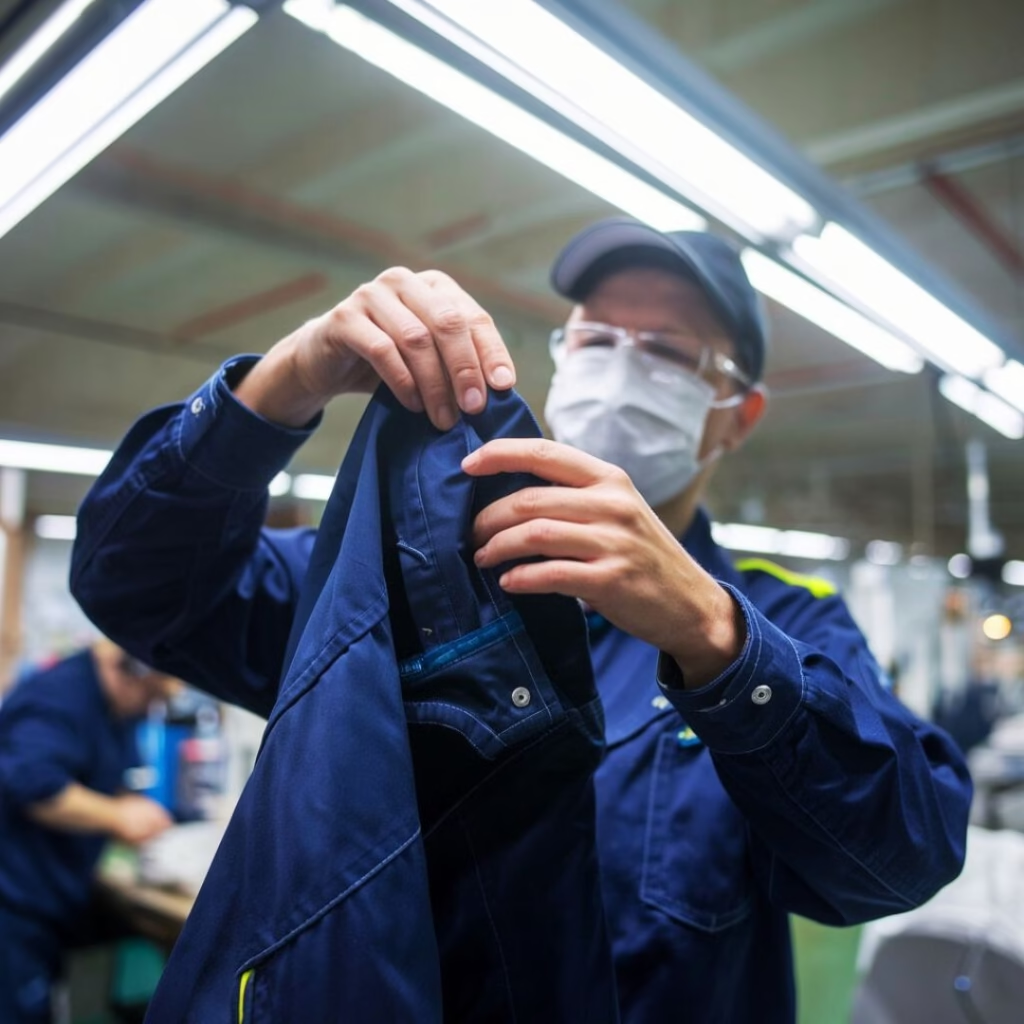
Manufacturing Flexibility and Customization
Production flexibility is a significant reason why many companies have their products made in Bangladesh:
Design Adaptation: Factories can quickly modify designs, incorporate brand requirements, and respond to market feedback efficiently.
Order Versatility: Manufacturers handle both large-scale production runs and smaller specialty orders with equal proficiency.
Trend Responsiveness: Quick turnaround capabilities allow brands to respond rapidly to changing fashion trends and consumer preferences.
Innovation Integration: Ability to incorporate new materials, production techniques, and technological advances into manufacturing processes.
Economic Impact: Why Many Companies Have Their Products Made in Bangladesh Benefits Global Economy
Transforming Communities and Lives
The positive economic impact demonstrates why many companies have their products made in Bangladesh creates sustainable benefits:
Employment Creation: The textile industry provides direct employment for over 4 million people, with millions more in supporting industries and services.
Women’s Empowerment: Approximately 80% of textile workers are women, providing economic independence and changing traditional social structures positively.
Economic Growth: Textile exports contribute over 80% of Bangladesh’s total export earnings and significantly to GDP growth.
Infrastructure Development: Industrial growth has catalyzed improvements in transportation, telecommunications, ports, and urban infrastructure.
Global Economic Integration Benefits
The reasons why many companies have their products made in Bangladesh extend to broader global economic advantages:
Supply Chain Efficiency: Bangladesh’s integration into global supply chains creates efficiencies and cost savings for brands worldwide.
Consumer Value: Competitive manufacturing costs help keep clothing and textile products affordable for consumers globally.
Market Access: Bangladesh’s production capabilities enable smaller and emerging brands to access professional manufacturing services.
Trade Balance: Strong export performance helps maintain healthy trade relationships between Bangladesh and importing countries.
Technology and Innovation: Future-Focused Reasons Why Many Companies Have Their Products Made in Bangladesh
Technological Advancement and Modernization
Technology adoption ensures that the reasons why many companies have their products made in Bangladesh will remain relevant in the future:
Smart Manufacturing: Integration of automation, IoT devices, and data analytics to optimize production efficiency and quality control.
Digital Systems: Advanced inventory management, order tracking, and communication systems that improve coordination with international clients.
Sustainable Technologies: Investment in cleaner production methods, renewable energy, and waste reduction technologies.
Innovation Capacity: Ability to quickly adopt new manufacturing techniques, materials, and production technologies as they become available.
Continuous Improvement Culture
Ongoing development initiatives ensure that why many companies have their products made in Bangladesh remains a positive choice:
Skills Development: Continuous education and training programs that enhance worker capabilities and career advancement opportunities.
Safety Enhancement: Ongoing investment in workplace safety, health programs, and worker welfare initiatives.
Environmental Progress: Progressive adoption of sustainable manufacturing practices and environmental protection measures.
Quality Evolution: Constant improvement in production standards, efficiency, and customer satisfaction levels.
Consumer Awareness: Understanding Why Many Companies Have Their Products Made in Bangladesh
The Global Connection Through Your Purchases
When you understand why many companies have their products made in Bangladesh, you gain insight into global economics:
Supply Chain Awareness: Recognize the complex international networks that bring products from factories to your closet.
Economic Impact Understanding: Appreciate how your purchasing decisions can positively impact workers and communities in Bangladesh.
Quality Recognition: Understand that “Made in Bangladesh” often represents high-quality, skillfully produced items.
Value Appreciation: Recognize the expertise, effort, and international coordination involved in creating affordable, quality products.
Making Informed Consumer Choices
Understanding why many companies have their products made in Bangladesh helps you make better purchasing decisions:
Brand Selection: Choose companies that demonstrate transparency about their manufacturing practices and commitment to worker welfare.
Quality Focus: Invest in well-constructed items that last longer, supporting sustainable manufacturing practices and reducing waste.
Ethical Shopping: Support brands that actively contribute to improving working conditions and environmental practices in their supply chains.
Global Citizenship: Understand your role in supporting international economic development through thoughtful purchasing decisions.
Industry Trends: Why Many Companies Have Their Products Made in Bangladesh Continues Growing
Market Expansion and Diversification
The textile industry in Bangladesh continues expanding, reinforcing why many companies have their products made in Bangladesh:
New Market Segments: Expansion into technical textiles, sustainable fashion, and specialized product categories.
Brand Partnerships: Increasing collaboration between Bangladeshi manufacturers and international brands across various market segments.
Product Innovation: Development of new fabric technologies, sustainable materials, and advanced manufacturing techniques.
Market Reach: Expansion into new geographic markets and customer segments worldwide.
Sustainable Development Focus
Sustainability initiatives are becoming important reasons why many companies have their products made in Bangladesh:
Environmental Responsibility: Implementation of cleaner production methods, water treatment systems, and renewable energy adoption.
Social Impact: Focus on worker education, healthcare, community development, and women’s empowerment programs.
Economic Sustainability: Building long-term economic growth that benefits all stakeholders in the supply chain.
Global Standards: Alignment with international sustainability standards and corporate social responsibility requirements.
Conclusion: The Complete Picture of Why Many Companies Have Their Products Made in Bangladesh
The question “Why do many companies have their products made in Bangladesh?” reveals a sophisticated story of economic development, international cooperation, and strategic advantage. Bangladesh has successfully created a comprehensive manufacturing ecosystem that offers:
- Economic competitiveness through cost-effective production and favorable trade policies
- Quality assurance through skilled workers and robust manufacturing systems
- Infrastructure reliability with efficient logistics and integrated supply chains
- Ethical manufacturing with improved safety standards and worker welfare programs
- Product versatility with capabilities spanning basic to luxury items
- Future readiness through technology adoption and continuous improvement
The reasons why many companies have their products made in Bangladesh represent more than just manufacturing – they represent a successful model of international economic integration that benefits companies, consumers, and communities.
Today, when you see “Made in Bangladesh” on your clothing or accessories, you’re seeing the result of decades of development, millions of skilled workers, and a country that has built its economy around serving global markets responsibly and efficiently.
The continued evolution and improvement of Bangladesh’s manufacturing sector ensures that the compelling reasons why many companies have their products made in Bangladesh will remain relevant and beneficial for all stakeholders – from international brands to local communities to global consumers.
As Bangladesh continues to modernize its manufacturing capabilities, improve working conditions, and adopt sustainable practices, the answer to why many companies have their products made in Bangladesh will only become more compelling, creating a positive cycle of growth, development, and international cooperation that benefits everyone involved in the global textile supply chain.
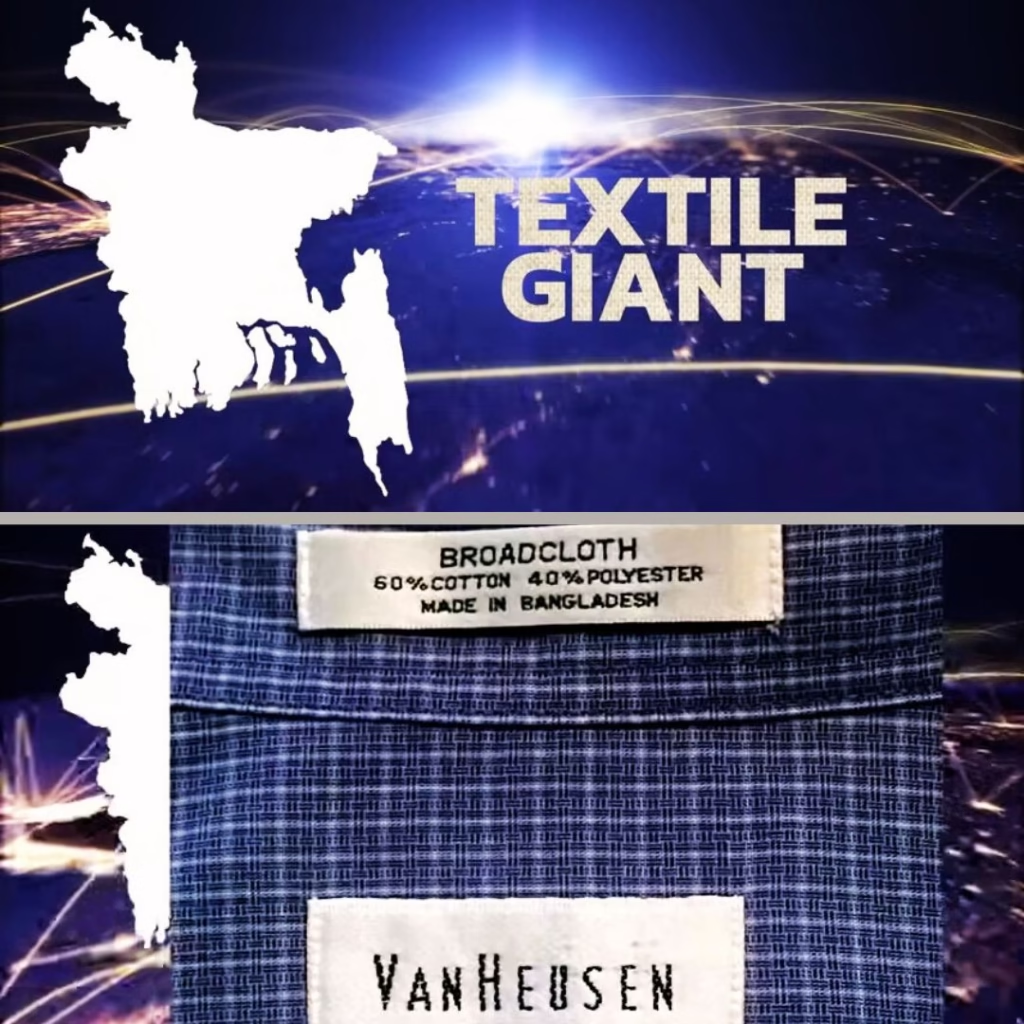
A highly relevant YouTube video related to our topic is titled “How Bangladesh Became a Global Textile Hub”. This video explains Bangladesh’s rise as a major player in the global garment industry, the history, challenges, and future of the country’s textile sector.
Here is the link to the video:
https://www.youtube.com/watch?v=hegw9UNoWzg

